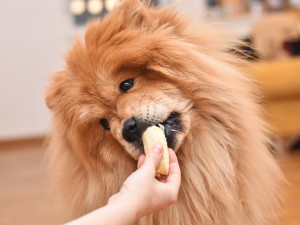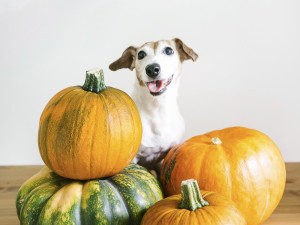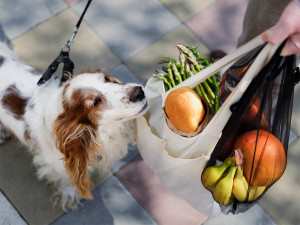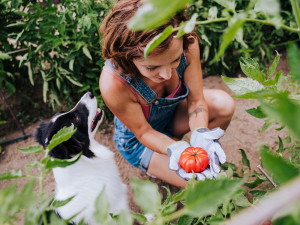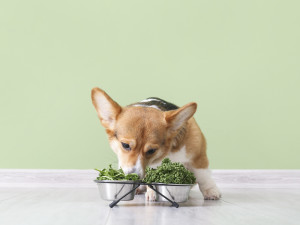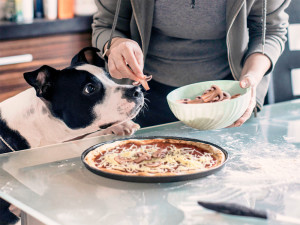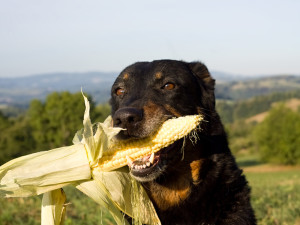Can Dogs Eat Cauliflower?
They want to munch on that crudité platter.

Share Article
Cauliflower can be a healthy snack for dogs when fed in moderation. Cauliflower is rich in fiber, vitamins, and antioxidants. It’s low in calories but filling, making it a good option for pups who need to lose weight but love to snack.
Nutrition facts: Cauliflower for dogs
Cauliflower (Brassica oleracea) is low in calories, highly nutritious, and safe for dogs to eat. For people, it’s a versatile addition to many dishes and is commonly used as a grain substitute — recipes for cauliflower rice, pizza crust, and pasta are easy to find. For dogs, the nutritional benefits of cauliflower include:

littleKin™ is Kinship’s home just for puppy and kitten parents. Bop over to check out expert advice, new pet tools, and special deals—all curated for your newest family member.
opens in a new tabLow in calories: This low-calorie veggie can be a filling treat for dogs on a weight loss plan.
Dietary fiber: Cauliflower is rich in fiber, which helps dogs maintain regular bowel movements and a healthy population of beneficial gut bacteria.
Choline: Choline is an essential nutrient that plays a vital role in various bodily functions. It supports liver health, brain development, muscle movement, nervous system function, and cardiovascular health.
Antioxidants: Cauliflower is packed with antioxidants. These compounds help protect cells from free radical damage, potentially decreasing the risk of certain cancers, heart disease, and sun damage.
Vitamins: Cauliflower contains lots of vitamins, including vitamin C, vitamin K, and B vitamins.
Is cauliflower good for dogs?
Cauliflower can be a healthy treat for dogs in moderation. It’s a filling, low-calorie snack that can help dogs on a weight loss plan. Veggies should be used only as treats, and dogs should get most of their nutrition from a complete and balanced diet that meets AAFCO (Association of American Feed Control Officials) standards. The fiber in cauliflower can also benefit digestive health. However, cauliflower and other cruciferous vegetables like broccoli and brussel sprouts may not be the best option for dogs with sensitive stomachs. Even without digestive issues, too much cauliflower can result in some pretty gnarly dog fartsopens in a new tab.
Can dogs eat raw cauliflower?
Dogs can eat raw cauliflower, but it may be better to cook it. Raw cauliflower is harder to digest and may be more likely to cause stomach upset. Large pieces of cauliflower stems can pose a choking hazard, especially for smaller dogs. If your pup likes raw cauliflower, it’s best to only feed florets or to cut it into small, bite-sized pieces before feeding it to your dog.
Is cauliflower completely safe for dogs?
Cauliflower is non-toxic for dogs and safe when fed in moderation. While cauliflower is asafe, nutritious treat, it should not be a major part of a dog’s diet. Large amounts of cauliflower can cause gastrointestinal upsetopens in a new tab, bloating, and gas.
How to feed cauliflower to a dog
Cauliflower can be a nutritious treat for dogs raw or cooked. If cooked, cauliflower can be prepared steamed, boiled, or roasted — just be sure to skip any oil, butter, or seasonings. Cut the cauliflower into bite-sized pieces, especially if offering it raw. Raw cauliflower florets pose less of a choking hazard than the stems. Always wash fruits and vegetables thoroughly to prevent bacterial contamination.
If cauliflower is a new treat for your pup, start with a small amount to gauge their tolerance. If your dog develops gastrointestinal upset or horrible, stinky fartsopens in a new tab, skip the cauliflower and try a different veggie. While cauliflower has tons of nutritional benefits, it should only make up a small portion of a dog’s diet. Cauliflower and other veggies and treats should not make up more than ten percent of a dog’s diet.
Ways your dog may enjoy cauliflower include:
Raw, low-calorie, bite-sized cauliflower treats
Cooked, chopped, and fed on top of wet food or dry kibble
Pureed for a fun whipped treat or meal topper
The bottom line: Can dogs eat human food?
Dogs can eat some human foods, and veggies like cauliflower can be a healthy treat for many pups. If your dog has a sensitive stomach or other health conditions, it’s best to consult with your vet before offering new foods. Human foods and treats should be fed in moderation: they should not make up more than ten percent of a dog’s diet.
Other foods that are safe for dogs
Broccoli: Broccoli has similar nutritional benefitsopens in a new tab to its cruciferous cousin, cauliflower. When comparing the two, broccoli has more vitamin C and K, while cauliflower is higher in B vitamins. Beware: too much of either can give your dog gas.
Riceopens in a new tab: Dogs can eat cooked white or brown riceopens in a new tab, but white rice is easier to digest and is preferred for dogs with gastrointestinal issues, despite brown rice having more nutrients.
Green beansopens in a new tab: Green beans are another low-calorie veggie that dogs love. Stick to feeding fresh beans (raw or cooked) because the canned varieties tend to have a high sodium content.
Other food that are dangerous for dogs
Bread doughopens in a new tab: When dogs eat raw dough with yeast, the yeast ferments in the dog’s stomach, producing carbon dioxide and ethanol. This leads to bloating, which can put some dogs at risk of developing gastric dilatation and volvulus (GDV). The ethanol is absorbed into the bloodstream, causing inebriation and alcohol poisoning. Bread dough toxicity in dogs can cause abdominal distension, disorientation, unsteady gait, weakness, seizures, and death.
Onions and garlicopens in a new tab: Dogs should not be fed onions, garlic, or any other member of the Allium family, which are known to cause hemolytic anemia in dogs. Onions and garlic in any form pose a risk, including raw, cooked, and products like garlic powder and onion dip.
Macadamia nuts: Macadamia nuts may be a popular addition to cookies, but they should never be fed to dogs. Macadamia nut toxicity in dogs can cause vomiting, weakness, muscle tremors, unsteady gait, and hyperthermia (elevated body temperature).
FAQs (People also ask):
Is cauliflower toxic to dogs?
Cauliflower is not toxic to dogs and is a safe snack to offer your pup. Although cauliflower is not toxic, it can cause stomach upset or flatulence in some dogs, especially in large amounts.
Can dogs eat raw cauliflower?
Dogs can eat cauliflower raw or cooked. Raw cauliflower should be offered in small pieces to avoid choking hazards and risk of intestinal obstruction. Raw cauliflower is also more likely to make dogs fart.
How much cauliflower can a dog eat?
Cauliflower should only be fed as an occasional treat for dogs. Any human foods or treats (even healthy ones) should be limited to being ten percent or less of a dog’s diet.
References:

Dr. Alycia Washington, DVM, MS
Alycia Washington, DVM, is a small animal emergency veterinarian based in North Carolina. She works as a relief veterinarianopens in a new tab and provides services to numerous emergency and specialty hospitals. Dr. Washington is also a children’s book author and freelance writer with a focus on veterinary medicine. She has a special fondness for turtles, honey bees, and penguins — none of which she treats. In her free time, Dr. Washington enjoys travel, good food, and good enough coffee.
Related articles
- opens in a new tab
Can Dogs Eat Tomatoes?
Bite-size pieces of ripe, red tomatoes are safe—but you should skip the marinara sauce.
![Happy couple cooking dinner with dog watching.]() opens in a new tab
opens in a new tabCan Dogs Eat Garlic?
Like vampires, they should stay far away. Here’s why.
- opens in a new tab
Can Dogs Eat Kale?
Yep — this superfood is good for your dog in small amounts.
- opens in a new tab
Can Dogs Eat Raw Chicken?
They’re definitely curious about what you’re chopping over there on the cutting board...
![Women in the kitchen baking mushroom pizza with her dog.]() opens in a new tab
opens in a new tabCan Dogs Eat Mushrooms?
Your dog is a fun-gi, but be careful which shrooms they eat.
- opens in a new tab
Can Dogs Eat Corn?
A few kernels are fine—but keep it off the cob.
